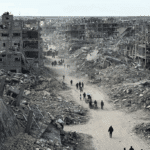Avocats Sans Frontières (ASF) is pleased to report that on 16 august 2011, the Military Garrison Court of Bukavu in the Province of South Kivu has in a mobile court* hearing, convicted two members of the F.D.L.R.*. Maniragula Jean Bosco alias Kazungu, who is considered to be a commander of one faction, has been convicted to life imprisonment while Sibomana Tuzarangwana alias Kabanda has been convicted to imprisonment for a term of 30 years.
DR Congo (DRC) has implemented the Rome Statute in its national legislation. It has also previously collaborated with the International Criminal Court (ICC) on the case involving another supposed F.D.L.R. member – Callixte Mbarushimana – who is currently being held for trial in the Hague.
However, ASF feels that this recent conviction is a first serious attempt of the DRC to take charge of the prosecution and conviction of F.D.L.R. members.
The F.D.L.R. group in question has committed various atrocities between 2005 and 2007 in the Kalehe region (South Kivu province). The defendants are prosecuted for crimes against humanity by rape (including sexual slavery), murder, torture and arbitrary imprisonment of civilians.
Over 450 victims were able to take part in the trial through the legal representation provided by ASF. Through provisions of the Rome Statute and a Congolese law of 2006 on sexual violence, around 30 victims have also had the opportunity to give their statements to the court anonymously.
It is important to highlight that the Military Court has set a new precedent by not only convicting the perpetrators but by also ordering the Congolese State to compensate the victims as a result of crimes committed by a foreign insurgency group. The Court based its decision on Article 52 of the Constitution which states that “all Congolese have a right to peace and security, both nationally and internationally”.The Democratic Republic of Congo has thus neglected its responsibility of securing the safety of the affected communities when they fell into the hands of armed groups.
ASF hopes that this judgement is a sign of a concrete commitment by the Congolese authorities to prosecute, by virtue of the principle of complementarity, both Congolese and foreign perpetrators of international crimes that are committed on its territory. According to this principle, prosecution is left in first instance to the States parties to the Rome Statute.
ASF finds the development of the process equitable and the sentence heavy but fair. DRC is sending a positive signal in the fight against impunity. This signal will be further reinforced if the Congolese State is to accept its conviction and compensate the victims.
* Mobile court hearings: involving the transfer of the entire court (registrar, judges, prosecutor) to remote rural areas where the population has no access to justice.
* Democratic Forces for the Liberation of Rwanda (D.F.L.R.): armed group of Rwandan Hutu that fled to DRC after the genocide of 1994. They are now established in eastern DRC and are fighting the Rwandese and Congolese army and committing crimes against humanity amongst the civil population.
For more information on the permanent mission in DR Congo



